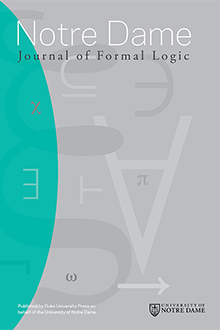Abstract
In many simple integral domains, such as or , there is a straightforward procedure to determine if an element is prime by simply reducing to a direct check of finitely many potential divisors. Despite the fact that such a naive approach does not immediately translate to integral domains like or the ring of integers in an algebraic number field, there still exist computational procedures that work to determine the prime elements in these cases. In contrast, we will show how to computably extend in such a way that we can control the ordinary integer primes in any way, all while maintaining unique factorization. As a corollary, we establish the existence of a computable unique factorization domain (UFD) such that the set of primes is -complete in every computable presentation.
Citation
Damir D. Dzhafarov. Joseph R. Mileti. "The Complexity of Primes in Computable Unique Factorization Domains." Notre Dame J. Formal Logic 59 (2) 139 - 156, 2018. https://doi.org/10.1215/00294527-2017-0024
Information





